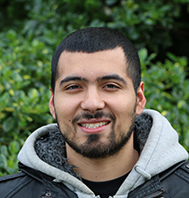Students help incarcerated youth work toward brighter futures
William Zaldana knows what it's like to be a troubled kid without a strong male role model, to drop out of high school and think college is not an option. But Zaldana, now an SF State senior majoring in criminal justice studies, was able to get his life back on track. After graduating in May, he plans to attend law school and become an immigration lawyer.

Student William Zaldana, a senior majoring in criminal justice studies, volunteers to mentor youth who are detained in juvenile hall.
For the past year, Zaldana has volunteered to help youth who, like him, have faced challenges and need a push in the right direction. Through the Youth Justice Mentoring Program, Zaldana and other SF State criminal justice students mentor youth aged 11 to 19 who are detained in San Francisco's juvenile hall. During a year of weekly meetings, student mentors become caring and understanding confidantes, sharing information about educational and career opportunities and providing support for transitioning back into society.
Zaldana talks about the positive changes he has made in his mentees' lives and how he himself has benefited from the experience.
Why did you get involved in the Youth Justice Mentoring Program?
When I was 14 or 15, I would have never thought I would be at a university. I was going through a lot of trouble; I dropped out of high school for awhile. I came a long way to where I am today. I wanted to help youth, to tell them that it's possible to achieve what they want in life, to get a degree -- you just have to put in the effort.
What is the process of working with mentees?
I meet with two mentees twice a week for an hour each session. I talk to them about where they see themselves in the future and how they can better themselves, help them with their homework. I talk to them about recidivism rates, tell them that they don't want to be another statistic. I try to give them advice without telling them exactly what to do.
How do you think your mentees have benefited from working with you?
They have a positive Latino male they can look up to, someone who has been through what they have been through: the poverty, not having positive male figures in life. One of the biggest things I've learned, and I've experienced this myself, is that these kids don't get a lot of resources when it comes to education, to find out about college. Two of the youth I worked with, I helped them through the process of applying to City College and they actually enrolled last semester. Now one wants to be a firefighter and the other a police officer. The youth I mentored who are not in the facility anymore and are no longer my mentees are still in contact with me. We're friends -- they still come to me for advice. One of them is getting straight A's now, and I'm really proud of him. He's said that if it wasn't for me, he wouldn't be in college. I tell him that it wasn't me -- that I gave him the information but his success came from within him. I tell all the youth I work with, "You are no different from me. You just have to have the work ethic and the right resources and surround yourself with the right people."
Has this experience changed the way you think about the criminal justice system?
It definitely has. I used to be tough on crime. I still am, but I realized the disproportionate sentencing that there is for minorities, not only in jail but also in juvenile facilities. It's really staggering. I've seen that a lot of them are not bad kids, they just did not have the right resources. There should be better programs to give young people knowledge. A lot of them don't know how they can get their high school diploma, and they think you need to be a straight-A student to go to college. Simple information -- these kids don't receive it.
What will you take away from your time at SF State?
More than anything, SF State has opened my mind to think differently. I used to be more cautious and keep to myself, but now I'm willing to help others better themselves, without expecting anything in return. If bettering others helps our community, that's the satisfaction that I get. Seeing my mentees go to college, seeing more males of color in college instead of in juvenile facilities, gives me a sense of pride.